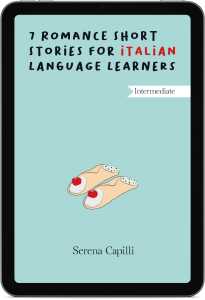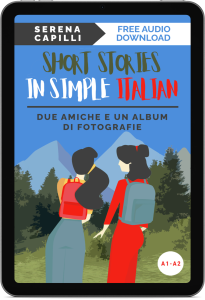1. For Starters, Flirt With Italian!
Familiarize yourself with the language: It is absolutely possible to master a foreign language as an adult (and advisable), but it takes time and patience. Knowing that it will be a long-term commitment, make sure you gain a sense of the language and, more importantly, what language learning feels like before fully committing to learning a whole new culture, vocabulary, and way of expressing yourself.
If you haven’t started learning Italian yet, I recommend experimenting with these tools to get your foot in the door. If you still enjoy it after a few weeks of exposure, it’s time to step up your game and take Italian language learning seriously.
My recommended starter kit for new Italian language learners (choose just one of these tools).
- Duolingo (free app)
- Michel Thomas Foundational Italian (audio program)
- Rocket Italian (a structured self-paced Italian course all levels, included complete beginners)
- Pimsleur (audio program)

2. Step Up Your Game
If the idea of speaking Italian fluently excites you, it makes sense to create a structured Italian learning plan..but how?
- Identify your level (beginner, intermediate, advanced).
- Gather a number of learning resources suitable for your level that will guide you from A to B (e.g., from beginner to intermediate).
- Set a goal (e.g., ‘I want to reach an intermediate level by next year…’).
- Commit to structured learning (block out one or two hours a week on your calendar dedicated to studying the language).

Test Your Italian
Not sure what your Italian level is? I’ve created a free online Italian test to help you determine it.3. Identify Your Learning Style
People differ, and students differ. There’s, by no stretch of the imagination, a one-size-fits-all approach for language learners. You’ll have to try out a number of things and eventually stick to the one that has granted you the best results.
Ask yourself, what type of student am I? Am I a visual learner, or do I learn better through listening? Then choose the resources that best suit your learning approach.
If you don’t know what your learning style is yet, you can take a test for free here.
4. Learn with Short Stories in Italian
- What Are Short Stories? Short stories are easy-to-read narratives, typically designed for beginners to intermediates. Delve into simplified stories to reinforce your grammar and vocabulary, while also mastering the construction of natural Italian sentences.
- How to Improve Your Vocabulary with Short Stories: We can’t easily learn words in isolation, but we can effectively learn new vocabulary in context. Short stories provide an effective path to contextual learning, as you’ll be able to attach visuals, stories, and events to key new vocabulary.
- How to Improve Your Listening with Short Stories: Many short stories include a voice recording in slow Italian. The best way to work on and improve your ability to understand Italian is by playing an audio geared towards your level and listening to it while reading it simultaneously. You should increase the level of the short stories you use as your ability to understand Italian gets better.
- How to Maximize Your Italian Study Time with Short Stories: You need to surround yourself with Italian learning material if you want to become fluent in Italian. One weekly class won’t do the job. Instead, reading and listening to simplified and engaging content every other day, like short stories, will do.
5. Structure your Learning
Solo learning is feasible for many, but there are innumerable advantages to learning in a more traditional setting, like accountability, boosted motivation, and structured learning plans. There are recommendations for approaching Italian learning in a goal-oriented way.
- If you live in the United States, consider enrolling in a community college or another Italian language institution. This is an excellent way to hold yourself accountable for your Italian learning while also enjoying a social activity. Keep in mind that ‘cheap’ often means classes with a large number of students and intensive group lessons when choosing a course. If possible, look for schools that provide small-group Italian lessons. It may cost more, but if you value your time, this is the way to go.
- Consider using a private tutor. Hiring a private Italian instructor is similar to hiring a personal trainer. A great Italian teacher will adapt to your needs and learning style, allowing you to achieve your goals more effectively and quickly. It’s easy to find tutors online these days (I’m one of them), but not all of them deliver the same results. Try out two or three different teachers and make sure that they follow a structured approach, create a learning plan for you, and assign weekly homework. Avoid learning ‘informally,’ which I define as picking up bits and pieces from various sources, such as teachers or YouTubers. You’ll never be able to learn properly
6. Practice from Day 1
But learning isn’t fun unless you put your new language superpower to the test in a real-world situation. That’s easier said than done, but even as a beginner, you can gain real-world experience with the Italian language, and here’s how:
- Find Italian conversation partners using apps like Tandem, HelloTalk, ConversationExchange (all are free).
- Use a tutor marketplace like Preply to find a tutor or simply a conversational partner.
- Join my newsletter to receive the best tips on how to learn a foreign language as an adult.
- If you have at least a lower-intermediate level, consider joining my Italian Speaking Club.

7. Master the Basics
Unlike English, Italian, as a Romance language, is highly structured and regular; in other words, the language follows predictable patterns. In layman’s terms, you learn a grammar rule and can apply it endlessly, with only a few exceptions. What you’ll need most as a beginner is a framework of simplified Italian grammar patterns to which you can attach bits and pieces of vocabulary you’ll learn along the way. So, yes, learning Italian grammar in small and digestible doses will be just right for you as you embark on your journey as an Italian language learner.










